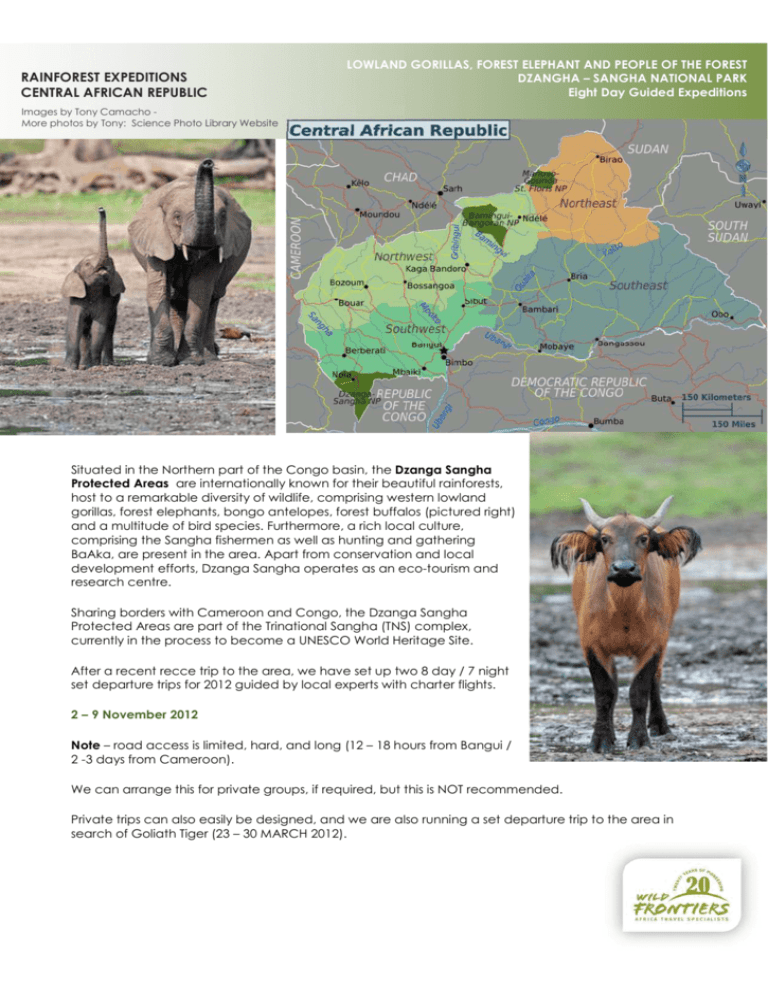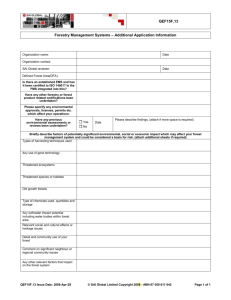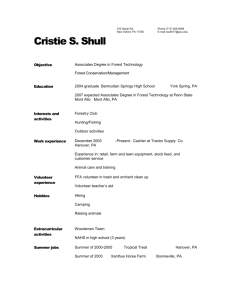
RAINFOREST EXPEDITIONS
CENTRAL AFRICAN REPUBLIC
LOWLAND GORILLAS, FOREST ELEPHANT AND PEOPLE OF THE FOREST
DZANGHA – SANGHA NATIONAL PARK
Eight Day Guided Expeditions
Images by Tony Camacho More photos by Tony: Science Photo Library Website
Situated in the Northern part of the Congo basin, the Dzanga Sangha
Protected Areas are internationally known for their beautiful rainforests,
host to a remarkable diversity of wildlife, comprising western lowland
gorillas, forest elephants, bongo antelopes, forest buffalos (pictured right)
and a multitude of bird species. Furthermore, a rich local culture,
comprising the Sangha fishermen as well as hunting and gathering
BaAka, are present in the area. Apart from conservation and local
development efforts, Dzanga Sangha operates as an eco-tourism and
research centre.
Sharing borders with Cameroon and Congo, the Dzanga Sangha
Protected Areas are part of the Trinational Sangha (TNS) complex,
currently in the process to become a UNESCO World Heritage Site.
After a recent recce trip to the area, we have set up two 8 day / 7 night
set departure trips for 2012 guided by local experts with charter flights.
2 – 9 November 2012
Note – road access is limited, hard, and long (12 – 18 hours from Bangui /
2 -3 days from Cameroon).
We can arrange this for private groups, if required, but this is NOT recommended.
Private trips can also easily be designed, and we are also running a set departure trip to the area in
search of Goliath Tiger (23 – 30 MARCH 2012).
ITINERARY
DAY 1
Charter flight in from BANGUI to BAYANGA. Flight
times and aircraft used to be advised, as well as
cost. Arrival and transfer to the Sangha Lodge in
time for lunch.
Situated on the banks of the Sangha River in the
Dzanga-Sangha special reserve, Sangha lodge is
the ideal tranquil spot from which to set off on
activities within the Dzanga-Sangha National Park,
and the perfect most relaxing spot to return to after
a long day in the field. The lodge consists of 6 well
appointed bungalows, each with their own ensuite
bathroom, with hot and cold running water and
flush toilets and 2 with a shared shower
and toilet, giving a total of 8 bungalows.
There is a well stocked bar with cold beer and
drinks, ice is made with Bottled water and is safe to
add to your drinks. A small kitchen produces simple
yet tasty Western and African foods
You will spend eight days / seven nights at Sangha
Lodge on a full board basis i.e. all meals included.
Evening: a sundowner cruise up river from the lodge
will take you into the area of the hill where the river
narrows considerably. Once there, the motor will be
turned off and we drift down slowly while drinking
gin and tonics or beer as we watch the sunset over
the forest and discuss the next week’s program with
your guide, Rod Cassidy.
DAY 2
To the Elephants at Dzangha Bai which is a full day excursion with a picnic lunch included.
Approximately 90 minutes by vehicle and an hour walk to the viewing platform.
To be able to observe the timid forest elephant in the wild is an experience usually reserved to a limited
circle of researchers. Dzanga Bai has always been known for its remarkable density of local wildlife,
and visitors have thus the chance to observe wildlife in a region covered by dense forest where this is
hardly possible. It is a forest clearing extending 500 by 250 meters, which can be reached after a walk
through primary forest on a path created by elephants.
The Dzanga Saline offers tourists the possibility to observe between 40 to 100 elephants daily from an
elevated platform located at its edge. The elevated density of wildlife can be explained by the
presence of soil that is rich in minerals and clay. Animals find these
minerals in the water stagnating on the surface as well as via
digging into the ground. Respective nutrients are essential for the
reproduction of elephants. Besides elephants many other animal
species that are characteristic for the Reserve may be observed:
Sitatunga, forest buffalo, Bongo Antelope, Red Forest Hog, and a
great variety of bird species.
Return to the lodge for dinner and overnight.
DAY 3
After breakfast – experience a net hunt with the Ba’aka. Return to
the lodge after lunch.
Accompany the BaAka pygmies hunting and help with the
carving up of the game, let the BaAka women show you the
medicinal and other plants of use, taste a typical dish of liana
leaves with a sauce made from forest nuts, watch how they
construct in the forest, in no time at all, a protective hut against
the rain. Getting to know this secret culture is an experience few
have known.
Net hunting mobilizes large groups of BaAka pygmy men and
women, who leave together for the forest. Normally each family
brings with them their long nets made from strips of liana bark
(locally known as “kusa”). Women transport their things in
traditional baskets made from fibres of the Raphia palm or from
“ikwa”. Young children are carried on the body and are tied to the waist with a piece of cloth. The
men carry the nets and spears.
Depending on the actual season, the net hunt can take place daily in the vicinity of the villages, but
can also sometimes be far away from the villages, from temporary forest camps.
In the afternoon, we visit a Ba’aka family and experience their
music and culture.
The essence of the BaAka culture that has been preserved over
the millennia, is mainly expressed in music and dance, serving to
maintain their bonds with their gods, spirits and ancestors.
Language could not fulfill this task very well as it was exposed to
many changes: instead of developing their own language the
BaAka often used the same language as their neighbours who
were of Bantu origin. This facilitated their link to the outside world
and to other groups of the population, but also caused many
modifications in language whenever the neighbours changed.
Music and dance, however, have always been an expression of
genuine BaAka feelings and imagination.
Each singer and percussionist chooses his or her
own rhythm resulting in a wonderful array of
harmony. This universe of movement, rhythm and sound is very difficult to describe, you have to
experience it for real.
After Dinner at the lodge, we walk with spotlights and guides into the forest behind the Lodge.
A deep, untouched rainforest, where elephants and wild gorillas are often heard and sometimes seen,
this experience is unique and not to be missed. Some of the more unusual nocturnal species like
Galago, Potto, Genet, Civet, Golden Cat, Hammer-Bat and a number of owls can be seen.
DAY 4
Gorillas – this is a full day excursion with a picnic lunch included.
There are now two places to view gorillas, and they only take 3 persons at a time – e.g. 6 per location
per day so one group will be about an hour “behind“ the other group of three OR three persons visit
the mangabeys, starting in early morning, then trek gorillas, whilst the others trek gorillas then
mangabeys.
It is an approximately 90 minute drive to the trekking base.
GORILLA TREKKING
Several international researchers as well as
other
team
members
are
living
permanently in the camp of Bai Hokou who
are responsible for locating and following
the gorillas each day. Early in the morning,
at sunrise, a team leaves the camp with
information on the location where the
gorillas slept the previous night. As soon as
the nest site is found, the team then follows
the traces the gorillas have left while
moving and feeding. This task could not be
achieved without the help of pygmy
trackers whose senses are perfectly in tune
with the forest. The tracking experience
alone, searching for the gorillas by following
their almost imperceptible signs on the
forest
floor,
leaves
you
with
an
unforgettable memory. To do this, one
takes elephant paths and narrow trails, sometimes crossing copses. The pursuit can be strenuous as
gorillas can sometimes cover significant distances before finding a fruit tree of choice. Sometimes one
or two hours pass before establishing contact with the gorillas. At noon the tracking team is replaced.
Its position is communicated to the camp by radio so the relief team can leave in the right direction.
Encountering the gorillas cannot be guaranteed, but nearly 90% of the tourists taking part in this
activity have seen gorillas in close proximity.
All participants have to take responsibility for any risk
themselves. The Park administration has fixed a minimum
age of 16. Visitors are informed of the rules of conduct at
the camp. No one with diarrhea, a cold or other
transmittable diseases will be allowed to participate, this
is so as not to endanger the gorillas’ health. The role of
the dominant male gorilla, the silverback, is to defend his
family, preventing the group from overly dispersing and
other males from leaving with resident females. This role
partly explains the mock charges against the pursuing
humans. If this occurs, one must wait in a knelt position
with the head declined. Charges can be up to only a
few meters away. Most of the time, researchers and
tourists are within 15 or 20 meters of the animals.
AGILE MANGABEY TREK
In 2004, the PHP diversified its activities and began
habituating a large group of agile mangabeys
(Cercocebus agilis) which have since been followed
daily. Agile managbeys are medium sized monkeys
(males 7-12kg, females 5-7kg) which very much live up
to their generic name by their vibrant nature. They are
mostly ground-dwelling, and feed on a diverse array of
fruits, seeds, stems, mushrooms, eggs, insects,
crustaceans, and even certain mammals. The group
can be observed at leisure at distances of under 10m
whilst their active hands rummage through leaf litter in
search of insects, investigating and extracting all that is
possibly edible from holes in trees, digging up
mushrooms, storing seeds in their cheek pouches, and
grooming their companions.
Agile mangabeys also have a vast vocal repertoire, with
the males possessing a vocal sac to amplify their
distinctive ‘whoops’ across the forest - allowing them to
communicate to the rest of their group and other
groups.
The group followed at Bai Hokou is of an exceptional
size, numbering more than 200 individuals, ranging in an
area covering many km2, and focused around the bai
system. The habituation process allows this otherwise
secretive and relatively unknown species to be easily
observed in the dense vegetation.
From the first months, the PHP were able to make
exceptional observations such as opportunistic hunting of young antelopes (duikers) by the males, and
a mid-year birthing season. However, with the potential to form such large groups, the social
organization of agile mangabeys is evidently complex, and much is still to be learnt.
Return to the Lodge for dinner and overnight.
DAY 5
Morning boat ride and birding from the lodge in search of Picathartes etc. Return for lunch.
Rod Cassidy and Barry Watkins recently discovered a hitherto unknown population of this extremely
rare species, the Red-necked Picathartes, breeding in a small colony of 3 birds less than 5 Kms from the
lodge. Further exploration, a week later by Rod Cassidy turned up another 3 nests over a 500 meter
stretch of cliff face. Even if not a birder, this hike up the river will show you some huge forest trees,
primates, waterfalls and other bird species, and an amazing view over the rainforest canopy. Agility
and fitness are required.
In the afternoon you will be driven to a river crossing (approximately 15 minutes by road) and board
pirogues with Ba’aka guides for a 4 -5 hour trip down the Yobe River to the main river, travelling
through some beautiful primary rainforest – viewing birds / primates etc. This river has been recently
opened up as a community project by the Ba’aka and Sangha Lodge, and now allows access to
areas once unknown to foreigners.
DAY 6
Option of second gorilla trek, those not doing a trek should do the Saline walk at Bai Hokou, from saline
to saline, with a picnic lunch…..this is an interesting day. If one decides on a second trek, the Saline
Walk can still be undertaken this day.
SALINE WALK
Following elephant paths through the forest from the camp, you are led to the wildlife’s’ favoured
spots. Often these are clearings and salines, crossed by streams, and kept open by the elephants. With
a bit of luck you will not only see forest elephants and buffalos, but also sitatunga, bongos, monkeys
and traces of other animals. The sounds, smells and the luminous green of the vegetation create a very
unique atmosphere.
Starting point of this activity is the research camp Bai Hokou, which is also focal point for “gorilla
tracking” and the “tracking of agile mangabeys”.
Return to Lodge in afternoon, where we spend a few hours with the resident Ba’aka families, learning
about their collection and usage of forest plants and herbs.In
BaAka pygmy culture medicinal plant know-how is kept primarily by the women. Men generally have a
basic knowledge covering their own needs, but it is the older women that most neighbours consult.
It is extremely interesting to accompany women in the forest and to observe the exceptionally skilful
movements of their hands and their handling of machetes, which is their preferred tool for even the
finest of work. Leaves are pressed to extract sap while at the same time rolling other leaves into a
funnel to apply the medicine to eyes and ears.
Here visitors can experience traditions that have been in existence for millennia and witness the
transmission of this knowledge from the mothers to the infants carried on their backs. These people,
who have no ways or means to go to a supermarket to buy string, cough syrup or the honey they so
relish, are perfectly in tune with the natural environment they live in. This activity is carried out in the
presence of a guide who can serve as an interpreter. In general the atmosphere is relaxed, allowing
you to pose as many questions as you like.
DAY 7
A further visit to Dzangha Bai, for elephants etc for a full day excursion with picnic lunch provided.
Return to the lodge in the evening for dinner and overnight.
Pricing
DAY 8
Transfer to BAYANGA AIRSTRIP for your chartered flight to BANGUI. Plane costs / timings are to be
ADDITIONAL INFO
advised.
Pricing:
Inclusions:- (note – sequence of activities may vary)
1. All park entry fees – 4 days
2. Guiding fees Rod Cassidy or another guide at the lodge and on activities (except gorillas,
which are NOT included and noted as extra costs) and all entry fees and costs attached to
him guiding these activities.
3. Charter – private – return 9 seater Caravan (COSTS are detailed separately)
4. Meet and greet in Bangui, return
5. Transfers in Bayanga
6. Private vehicle usage, max 4 pax per vehicle
7. Sundowner boat trip including drinks on Day 1
8. Night Forest walk with spotlights on Day 3
9. Dzangha Bai platform, 2 x visits on Day 2 & Day 7
10. Mangabey Trek x 1 on Day 4
11. Pirogue trip on Yobe and Sangha River on Day 5
12. Net Hunt with Ba’aka on Day 3
13. Ba’aka Medicinal Plants and Dance on Day 3 & 6
14. Trek to the waterfalls / birding for Picathartes on Day 5
15. Saline Walk at Bai Hokou on Day 6
16. 7 nights accommodation on a full board basis
17. Nightly Tourism Levy
Exclusions:1.
2.
3.
4.
5.
International flights and taxes
Meals not stated
Drinks
Tips, laundry , items not specified and services not specified
Gorilla Trekking fees of E 230 per person first trek , less 25 % on second trek ( note the ENTRY fee
to do this activity is already included). These have to be booked well in advance due to limited
numbers.
6. Charter costs
7. Visas, travel insurance and health requirements etc.
COSTS (BASED ON A MINIMUM OF 6 PERSONS / MAXIMUM OF 9 PERSONS PER DEPARTURE)
= € 2900.00 per person sharing
= € 250 single room supplement
Return charter BANGUI – BAYANGA – BANGUI = € 700.00 per person (*subject to aircraft availability)
*All prices are subject to change due to any unforeseen price increase. Christmas and New Year
supplements excluded.
ADDITIONAL INFO
ACCESS
These trips have been set up to work with the Kenya Airways flights to and from Bangui, from Nairobi,
and allow for seamless connections (currently) - and include meet and greet off this flight and
assistance to and from the charter. If arriving in C.A.R. on other flights, you may require overnights in
Bangui on the way in and out – these can be included but at an extra cost.
VISAS / HEALTH ETC – please enquire for details and weblinks to relevant sites.
CONTACT:
Wild Frontiers (Pty) Ltd.
Tel: +27 (01) 087 941 3892 or +27 (0) 72 927 7529
Fax: +27 (0) 86 689 6759
Alternative fax: +27 86 689 6159
Central Reservations: Dewald@wildfrontiers.com
PO Box 844, Halfway House, 1685
Copyright WILD FRONTIERS 2012
Copyright and database rights protection exists in this publication and all rights are reserved. The document is furthermore
provided for the information of WILD FRONTIERS’ clients only.
This publication or any part thereof may not be reproduced, transmitted, conveyed, communicated or used in any form or by
any means, whether in whole or in part, without the prior written permission
of WILD FRONTIERS. E. & O.E.









